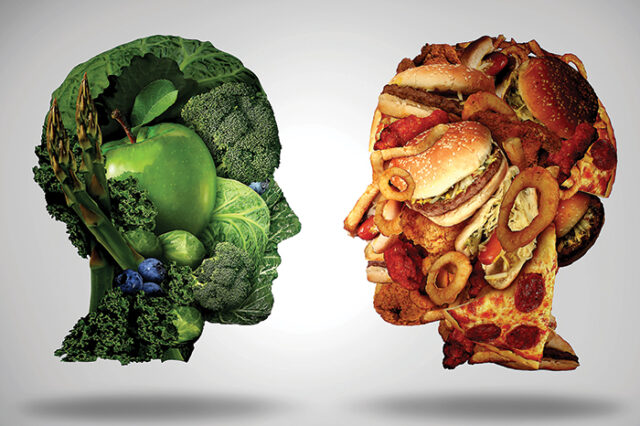
LAURA SHAMMAH MS, RDN
PEOPLE WITH ADHD know how much the condition can affect all aspects of their life — from how well they do in school to their relationships. But many people with ADHD may not be as aware of just how much the condition can influence their eating habits. And if left unchecked, these poor eating habits could eventually affect their mental and physical health.
Some of the most common problems are “hyper fixation” and binge eating. Hyper fixation is an intense fixation on certain activities or interests but can include eating habits, too. This means some people may only eat a specific food or meal for a while before becoming tired of it and moving on to a different food or meal.
Studies have also shown an association between ADHD and certain eating disorders, with binge eating disorders being one of the most common. Binge eating disorder is when people consume large amounts of foods over a short time, even when they’re not hungry. It’s estimated that almost a third of people in the U.S. who have binge eating disorders also have ADHD.
Some experts believe that people with ADHD may overeat to satisfy their need for stimulation. Binge eating may also happen because ADHD makes it difficult for people to have self-control and self-regulation, meaning they may be more likely to overeat if they’re feeling sad or angry, and they may not find it as easy to know when they’re full.
Some evidence suggests that binge eating in people with ADHD may be attributed to a heightened neural-reward response to food rather than impulsivity. This is when the brain is exposed to a stimulus that is rewarding and responds by releasing an increased amount of dopamine, a chemical in the brain associated with reward and pleasure. However, impulsiveness (another symptom of ADHD) may also lead people to overeat — especially foods that are unhealthy.
Some ADHD medications can also suppress appetite during the day. But as the drug’s effects wear off in the evening, appetite increases, which may lead to binge eating. Sensory issues may also explain why some people with ADHD tend to eat or avoid certain foods. Certain textures or smells may cause sensory overload, making it difficult for people with ADHD to eat them – leading to avoidance of those foods or food groups altogether. Dopamine may explain why people with ADHD prefer high-sugar foods.
There’s also evidence that people with ADHD tend to gravitate toward junk foods, especially food that is high in sugar. This may be because high-sugar foods stimulate the release of dopamine. People with ADHD have lower levels of dopamine. As such, they may be more likely to seek dopamine out. Since eating simple carbohydrates like candy triggers a rush of dopamine in the brain, this may be why people with ADHD tend to hyper-fixate or binge on these foods.
NUTRITION AND ADHD
Not having a varied diet or only eating foods that may be high in sugar can lead to a range of health problems, from vitamin deficiencies to obesity. High-sugar diets can also affect energy levels and mood. Highly processed additives and preservatives, may also change behavior and cognitive development.
Several studies have shown nutritional deficiencies can affect behavior and cognitive function in people with ADHD. Vitamin D and magnesium, in particular, are important, they may improve attention and decrease hyperactivity somewhat. Vitamin D can also affect the way dopamine forms in the brain.
But even though ADHD can make it harder to keep eating habits in check, if you have ADHD, there are things you can do to improve the situation. Here are some of them:
1.PLAN
Shop and plan meals for the week ahead. Planning meals makes it easier to decide what and when to eat and may help you avoid buying or bingeing on unhealthy, processed foods.
2.EAT SMALL BUT NUTRITIOUS MEALS THROUGHOUT THE DAY
If these are planned, it can help you avoid filling up on unhealthy snacks – and may also help you avoid evening binges if you’re someone who forgets to eat throughout the day or medication suppresses daytime appetite. A balance vegetable, protein and complex carbohydrates (such as chicken, beans, and whole grains) and healthy fat will help you get enough proper nutrients and vitamins but will also help you feel fuller for longer and give you energy. This also helps brain focus and function better.
3. CREATE A HEALTHY FOOD
ENVIRONMENT AT HOME

Keep nutritious snacks in sight – such as fruit or vegetables, nuts and seeds, which may help improve your attention.
4.SUPPLEMENT CERTAIN VITAMINS AND MINERALS
People with ADHD are more likely to be deficient in certain micronutrients. Ask your doctor if including omega-3, magnesium, and zinc would be right for you. These nutrients are important for ensuring the brain, body, and immune system all function at their best.
While it may not always be easy to adjust your diet, working with a nutritionist, a psychologist, a psychiatrist, getting help from a loved one, or even using a daily meal planner may all be useful in helping you get on track. Even making just a few small changes to your daily eating habits can have a big positive impact on your daily routine and wellbeing.
I see many clients with ADD/ADHD who struggle with eating disorders. Once they find what I call their right cocktail they find success. What is the right cocktail? Everyone is different. For some it is going to therapy, a dietitian, exercise and taking supplements and for some taking right medication along with above is like putting on eyeglasses for someone who couldn’t see. If you are struggling find out what your right cocktail is–reach out to professionals to help you find it so you can live you best life.
Laura Shammah MS, RDN specializes in eating disorders but has clientele that run the gamut from people dealing with PCOS, infertility, hypertension, high cholesterol, Crohn’s disease, diabetes and cancer. She also helps clients who run in marathons, are pregnant and those who would like to lose or gain weight in a healthy way.



